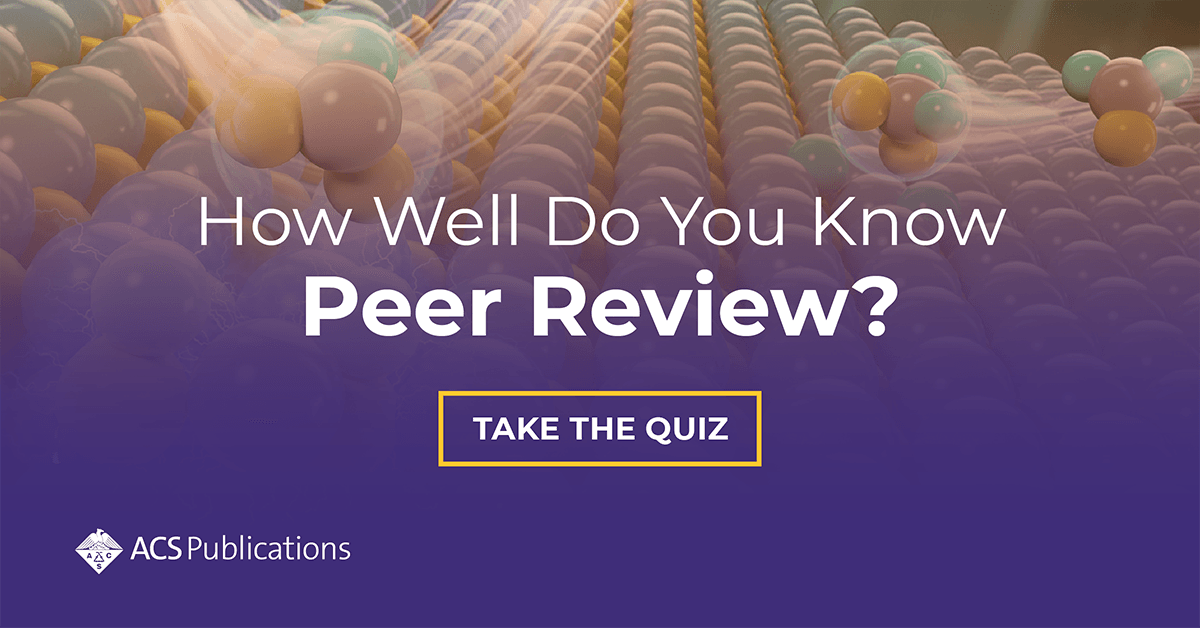In this post, part of our Peer Review Week 2022 series, find out how Prof. Tierui Zhang approaches the peer review process and read the advice he gives to fellow peer reviewers. Then, take the ACS Reviewer Lab “How Well Do You Know Peer Review?” quiz to test your knowledge of the peer review process.

Meet Prof. Tierui Zhang, Technical Institute of Physics and Chemistry (TIPC), Chinese Academy of Sciences (CAS)
We end this series with Prof. Tierui Zhang, Technical Institute of Physics and Chemistry (TIPC), Chinese Academy of Sciences (CAS). Prof. Zhang was selected because of the impressive number of ACS manuscripts he reviewed over the past year as well as being a highly cited author in the fields of chemistry and material sciences.
Find out how Prof. Zhang approaches the peer review process and read the advice he gives to fellow peer reviewers. Then take the ACS Reviewer Lab “How Well Do You Know Peer Review?” quiz to test your knowledge of the peer review process.
What is the one thing you frequently do before you sit down to start a review?
I make sure to look at the article title, author information to prevent conflict of interest, and the scope of the journal before I start reviewing the manuscript. I also plan my time so the submission date of my review will be as early as possible and according to the deadline and schedule the journal has set.
What are some challenges you experience as a peer reviewer?
For me, the main challenges are twofold. One is to have a sufficient understanding of the research field to which the article belongs, to have a clear understanding of its cutting-edge developments, and to be able to accurately evaluate the value of the work, such as whether similar works have been published, or whether the authors have omitted some important relevant references, etc.
Another challenge involves dedicating enough time to read through the whole manuscript at least twice, so as not to misread the author’s intentions and not miss important details. I think these two points are challenging to most reviewers in terms of expertise and time management, but only by doing this can we make an accurate assessment of the innovation and academic contribution of the submitted manuscript.
What would you tell someone if they asked you why they should be a Peer Reviewer?
Reviewing manuscripts is very helpful to researchers. Not only can they get a first-hand look at the latest developments in the related fields, thereby broadening their research thinking, but they can also clearly grasp the key factors that they need to pay attention to during the review process. Being a peer reviewer can improve the quality of their own manuscripts.
What is your advice for those who are just starting out as peer reviewers?
Peer reviewers need to take their responsibility seriously, and develop their skills by learning from excellent reviews. They need to treat each manuscript with care and respect. When rejecting a manuscript, the reasons should be clear, thoughtful, and productive.
Remember that review comments cannot be given without reading the article carefully a number of times, and vague comments shouldn’t be given without explanation. Reviewers should focus their assessments on the innovation and academic contribution of the work while paying attention to the reproducibility of the experiment and referring textual errors to the editor.
How Well Do You Know Peer Review?

Whether you accomplish 365 reviews or are invited to review one manuscript over the course of the year, your contribution and impact are still significant, valuable, and essential to supporting and creating trust in research as part of the research and publishing processes.
Take the ACS Publications “How Well Do You Know Peer Review?” quiz to test your knowledge of the peer review process.